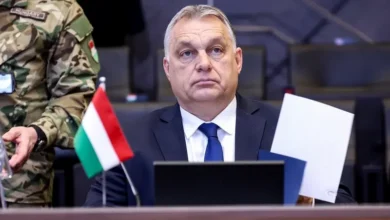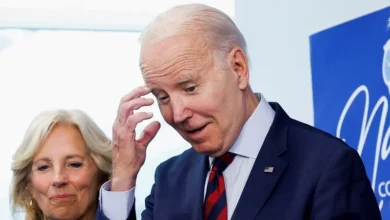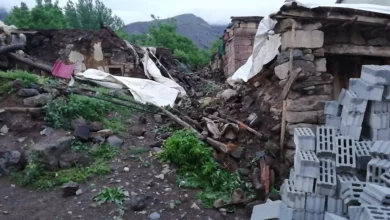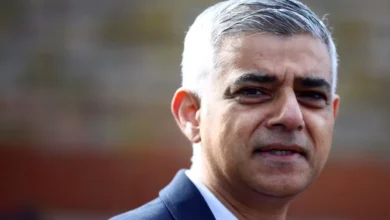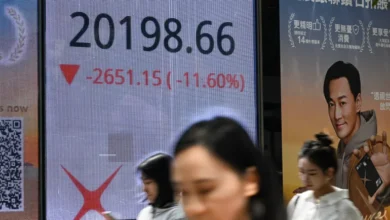Biden makes first visit to US-Mexico border since taking office
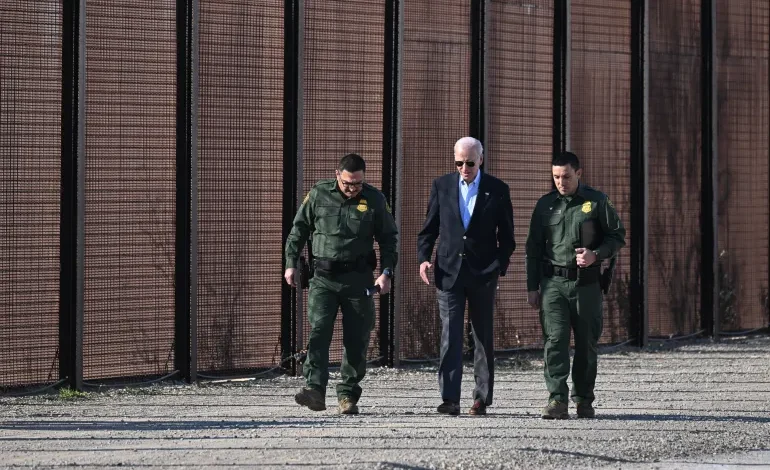
United States President Joe Biden has made his first visit to the US-Mexico border since taking office in January of 2022.
The hours-long visit on Sunday followed a recently announced policy initiative by the Biden administration meant to address an increase in undocumented border crossing.
The politically charged issue has dogged the Democratic president since taking office, with Republican critics charging the administration has been too lenient, and rights groups charging the newly announced measures will put asylum seekers’ lives at risk.
The stop in the city of El Paso, Texas, took place as Biden travelled to Mexico, where he is set to meet President Andres Manuel Lopez Obrador on Monday before attending a three-way summit with Canadian Prime Minister Justin Trudeau the following day in Mexico City.
“They need a lot of resources. We’re going to get it for them,” Biden told reporters in Texas, where he met border agents at the Bridge of the Americas, which connects El Paso to the Mexican city of Ciudad Juarez, and is one of the busiest ports of entry between the two countries.
During the visit, Biden watched as border officers in El Paso demonstrated how they search vehicles for drugs, money and other contraband. He later inspected a section of the tall fencing along the border between El Paso and Ciudad Juarez.
Meanwhile, in a sign of the deep political tensions over immigration, Republican Governor Greg Abbott handed Biden a letter on his arrival that said the alleged “chaos” at the border was the “direct result” of the president’s failure to enforce federal laws.
Controversial asylum policies
Last week, the Biden administration unveiled new immigration rules it anticipates will “substantially reduce” the number of people seeking to cross the southern border, Biden told reporters at the time.
The rules create a new programme that allows a legal pathway for as many as 30,000 Cuban, Haitian, Nicaraguan and Venezuelan nationals to enter the US a month and receive two-year work permits, provided they have sponsors in the US and pass background checks.
In turn, the policy allows US authorities to expel to Mexico residents of those four countries who irregularly cross the border and bar them from accessing the programme. Mexico has agreed to accept 30,000 expelled residents of the four countries in a month, according to the administration.
Rights groups say the policy is harmful to individuals who have no other choice but to irregularly cross the border to seek asylum. They charge the new policy is an extension of the former President Donald Trump-era Title 42, which allows authorities to rapidly expel adult asylum seekers crossing the border, citing COVID-19 health concerns.
After a lengthy court battle, a US federal judge in November ordered Title 42 be lifted, but the US Supreme Court late last month agreed to consider whether Republican-led states can challenge the end of the policy, leaving it in place for the time being.
In the wake of last week’s announcement, Heidi Altman, policy director at the National Immigrant Justice Center, accused the Biden administration of “openly rejecting” US law, which “clearly says it is legal to arrive at the border & seek asylum”.
On board Air Force One on Sunday, Homeland Security Secretary Alejandro Mayorkas told reporters that the administration was trying to “incentivise a safe and orderly way and cut out the smuggling organisations”.
He said the policy was “not a ban at all”, but an attempt to protect migrants and refugees from the trauma smuggling can create.
Drugs, economy top Mexico visit
Following the border visit, Biden was set to continue on to Mexico, where the increase in crossings, as well as efforts to fight the trafficking of fentanyl and other drugs that have fuelled a deadly addiction crisis in the US, were set to top the agenda of the bilateral meeting with Lopez Obrador.
On Saturday, National Security Council spokesperson John Kirby said Washington was “making strides” with its partners to seize illicit opioids and other drugs, calling it an “ongoing effort”.




